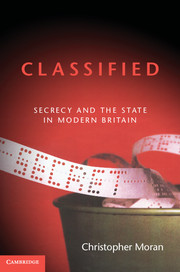Book contents
- Frontmatter
- Contents
- Illustrations
- Foreword
- Acknowledgements
- Abbreviations
- Introduction
- Part I 1889–1945
- 1 Laying the foundations of control
- 2 Bending the rules: ministers and their memoirs 1920–1945
- Part II Secrecy and the press
- Part III Secrecy and political memoirs
- Part IV Intelligence secrets, spy memoirs and official histories
- Notes
- Bibliography
- Index
- Plate section
2 - Bending the rules: ministers and their memoirs 1920–1945
Published online by Cambridge University Press: 05 April 2013
- Frontmatter
- Contents
- Illustrations
- Foreword
- Acknowledgements
- Abbreviations
- Introduction
- Part I 1889–1945
- 1 Laying the foundations of control
- 2 Bending the rules: ministers and their memoirs 1920–1945
- Part II Secrecy and the press
- Part III Secrecy and political memoirs
- Part IV Intelligence secrets, spy memoirs and official histories
- Notes
- Bibliography
- Index
- Plate section
Summary
The theory underlying what was done in regard to documents of the last war has never . . . been exactly stated, for the reason that what really happened was that many of the great ones took the law into their own hands.
Edward Bridges, Cabinet Secretary, 5 November 1943In the period 1920 to 1945, British secrecy was undermined by individuals who should have known better. During this time, secrets entered the public domain not through investigative reporting, but through best-selling memoirs produced by politicians of the first rank. In their accounts, leading statesmen like Winston Churchill and David Lloyd George exposed in unprecedented detail the discussions, decisions and people that had been important in their careers in high office. Works overflowed with quotations from Cabinet documents, all of which were supposed to be inviolable and which were subject to at least a fifty-year embargo on public release. ‘This is an age of revelation and “of the truth about” almost any occurrence in recent history,’ observed The Times in 1933.
Since the disclosure of secrets – though laudable in a journalist – is ostensibly counter-intuitive to the creed of a crown servant, it is logical to ask how this situation came about. As this chapter will discuss, the catalyst was the Great War. In the 1920s and 1930s, the history of the war became a contested battleground, producing a flood of writings dedicated to explaining the conduct and experience of those who had taken part. Eclipsing all previous conflicts by its scale of destruction, the war became the most-written-about event of modern times, as people sought to comprehend the circumstances which had led to the carnage of the Western Front. Everyone had their say. The state itself produced a grand 28-volume official history. With memoirs, the ‘brass hats’ upbraided the ‘frocks’, and vice versa. Moreover, for every soldier-poet like Wilfred Owen or Siegfried Sassoon who slammed the idiocy of the generals, there were as many writers who gave them credit for Britain's ultimate victory and attributed the losses incurred to either exceptional circumstances or the meddling of politicians back home. Such was the strong feeling aroused by the war and the passion among authors to tell their side of the story, that the Victorian expectation that public officials should be treated respectfully, especially by their peers, was gradually worn away. The first generation of historiography on the war was eye-catching for the sheer ferocity of the attacks directed at some of the personalities involved.
- Type
- Chapter
- Information
- ClassifiedSecrecy and the State in Modern Britain, pp. 53 - 92Publisher: Cambridge University PressPrint publication year: 2012



